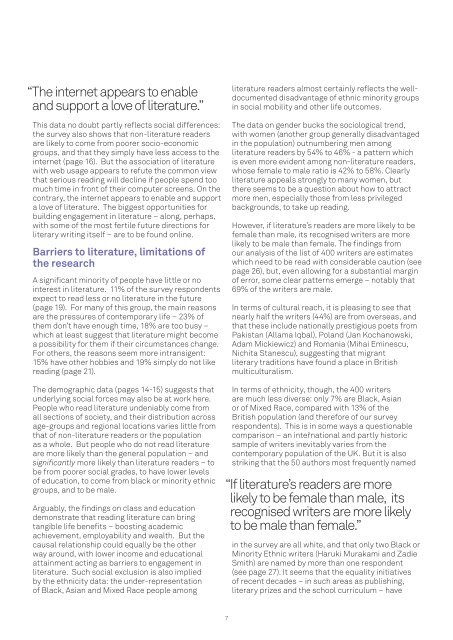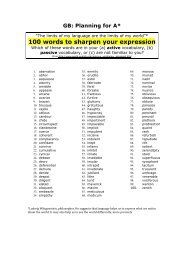Literature in Britain today
2lpda8n
2lpda8n
Create successful ePaper yourself
Turn your PDF publications into a flip-book with our unique Google optimized e-Paper software.
“The <strong>in</strong>ternet appears to enable<br />
and support a love of literature.”<br />
This data no doubt partly reflects social differences:<br />
the survey also shows that non-literature readers<br />
are likely to come from poorer socio-economic<br />
groups, and that they simply have less access to the<br />
<strong>in</strong>ternet (page 16). But the association of literature<br />
with web usage appears to refute the common view<br />
that serious read<strong>in</strong>g will decl<strong>in</strong>e if people spend too<br />
much time <strong>in</strong> front of their computer screens. On the<br />
contrary, the <strong>in</strong>ternet appears to enable and support<br />
a love of literature. The biggest opportunities for<br />
build<strong>in</strong>g engagement <strong>in</strong> literature – along, perhaps,<br />
with some of the most fertile future directions for<br />
literary writ<strong>in</strong>g itself – are to be found onl<strong>in</strong>e.<br />
Barriers to literature, limitations of<br />
the research<br />
A significant m<strong>in</strong>ority of people have little or no<br />
<strong>in</strong>terest <strong>in</strong> literature. 11% of the survey respondents<br />
expect to read less or no literature <strong>in</strong> the future<br />
(page 19). For many of this group, the ma<strong>in</strong> reasons<br />
are the pressures of contemporary life – 23% of<br />
them don’t have enough time, 18% are too busy –<br />
which at least suggest that literature might become<br />
a possibility for them if their circumstances change.<br />
For others, the reasons seem more <strong>in</strong>transigent:<br />
15% have other hobbies and 19% simply do not like<br />
read<strong>in</strong>g (page 21).<br />
The demographic data (pages 14-15) suggests that<br />
underly<strong>in</strong>g social forces may also be at work here.<br />
People who read literature undeniably come from<br />
all sections of society, and their distribution across<br />
age-groups and regional locations varies little from<br />
that of non-literature readers or the population<br />
as a whole. But people who do not read literature<br />
are more likely than the general population – and<br />
significantly more likely than literature readers – to<br />
be from poorer social grades, to have lower levels<br />
of education, to come from black or m<strong>in</strong>ority ethnic<br />
groups, and to be male.<br />
Arguably, the f<strong>in</strong>d<strong>in</strong>gs on class and education<br />
demonstrate that read<strong>in</strong>g literature can br<strong>in</strong>g<br />
tangible life benefits – boost<strong>in</strong>g academic<br />
achievement, employability and wealth. But the<br />
causal relationship could equally be the other<br />
way around, with lower <strong>in</strong>come and educational<br />
atta<strong>in</strong>ment act<strong>in</strong>g as barriers to engagement <strong>in</strong><br />
literature. Such social exclusion is also implied<br />
by the ethnicity data: the under-representation<br />
of Black, Asian and Mixed Race people among<br />
literature readers almost certa<strong>in</strong>ly reflects the welldocumented<br />
disadvantage of ethnic m<strong>in</strong>ority groups<br />
<strong>in</strong> social mobility and other life outcomes.<br />
The data on gender bucks the sociological trend,<br />
with women (another group generally disadvantaged<br />
<strong>in</strong> the population) outnumber<strong>in</strong>g men among<br />
literature readers by 54% to 46% - a pattern which<br />
is even more evident among non-literature readers,<br />
whose female to male ratio is 42% to 58%. Clearly<br />
literature appeals strongly to many women, but<br />
there seems to be a question about how to attract<br />
more men, especially those from less privileged<br />
backgrounds, to take up read<strong>in</strong>g.<br />
However, if literature’s readers are more likely to be<br />
female than male, its recognised writers are more<br />
likely to be male than female. The f<strong>in</strong>d<strong>in</strong>gs from<br />
our analysis of the list of 400 writers are estimates<br />
which need to be read with considerable caution (see<br />
page 26), but, even allow<strong>in</strong>g for a substantial marg<strong>in</strong><br />
of error, some clear patterns emerge – notably that<br />
69% of the writers are male.<br />
In terms of cultural reach, it is pleas<strong>in</strong>g to see that<br />
nearly half the writers (44%) are from overseas, and<br />
that these <strong>in</strong>clude nationally prestigious poets from<br />
Pakistan (Allama Iqbal), Poland (Jan Kochanowski,<br />
Adam Mickiewicz) and Romania (Mihai Em<strong>in</strong>escu,<br />
Nichita Stanescu), suggest<strong>in</strong>g that migrant<br />
literary traditions have found a place <strong>in</strong> British<br />
multiculturalism.<br />
In terms of ethnicity, though, the 400 writers<br />
are much less diverse: only 7% are Black, Asian<br />
or of Mixed Race, compared with 13% of the<br />
British population (and therefore of our survey<br />
respondents). This is <strong>in</strong> some ways a questionable<br />
comparison – an <strong>in</strong>ternational ˘ and partly historic<br />
sample of writers <strong>in</strong>evitably varies from the<br />
contemporary population of the UK. But it is also<br />
strik<strong>in</strong>g that the 50 authors most frequently named<br />
“If literature’s readers are more<br />
likely to be female than male, its<br />
recognised writers are more likely<br />
to be male than female.”<br />
<strong>in</strong> the survey are all white, and that only two Black or<br />
M<strong>in</strong>ority Ethnic writers (Haruki Murakami and Zadie<br />
Smith) are named by more than one respondent<br />
(see page 27). It seems that the equality <strong>in</strong>itiatives<br />
of recent decades – <strong>in</strong> such areas as publish<strong>in</strong>g,<br />
literary prizes and the school curriculum – have<br />
7




